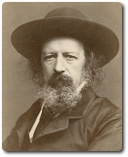Gerard Manley Hopkins, selected poems Contents
- As Kingfishers Catch Fire
- Binsey Poplars
- The Blessed Virgin Mary Compared to the Air We Breathe
- Carrion Comfort
- Duns Scotus' Oxford
- God's Grandeur
- Harry Ploughman
- Henry Purcell
- Hurrahing in Harvest
- Inversnaid
- I Wake and Feel the Fell of Dark
- Synopsis of I Wake and Feel the Fell of Dark
- Commentary on I Wake and Feel the Fell of Dark
- Language and tone in I Wake and Feel the Fell of Dark
- Structure and versification in I Wake and Feel the Fell of Dark
- Imagery and symbolism in I Wake and Feel the Fell of Dark
- Themes in I Wake and Feel the Fell of Dark
- The Leaden Echo and the Golden Echo
- Synopsis of The Leaden Echo and the Golden Echo
- Commentary on The Leaden Echo and the Golden Echo
- Language and tone in The Leaden Echo and the Golden Echo
- Structure and versification in The Leaden Echo and the Golden Echo
- Imagery and symbolism in The Leaden Echo and the Golden Echo
- Themes in The Leaden Echo and the Golden Echo
- The May Magnificat
- My Own Heart, Let Me Have More Pity On
- Synopsis of My Own Heart, Let Me Have More Pity On
- Commentary on My Own Heart, Let Me Have More Pity On
- Language and tone in My Own Heart, Let Me Have More Pity On
- Structure and versification in My Own Heart, Let Me Have More Pity On
- Imagery and symbolism in My Own Heart, Let Me Have More Pity On
- Themes in My Own Heart, Let Me Have More Pity On
- No Worst, There is None
- Patience, Hard Thing!
- Pied Beauty
- The Sea and the Skylark
- Spelt from Sibyl's Leaves
- Spring
- Spring and Fall
- St. Alphonsus Rodriguez
- The Starlight Night
- That Nature is a Heraclitean Fire and of the Comfort of the Resurrection
- Synopsis of That Nature is a Heraclitean Fire
- Commentary on That Nature is a Heraclitean Fire
- Language and tone in That Nature is a Heraclitean Fire
- Structure and versification in That Nature is a Heraclitean Fire
- Imagery and symbolism in That Nature is a Heraclitean Fire
- Themes in That Nature is a Heraclitean Fire
- Thou Art Indeed Just, Lord
- Tom's Garland
- To Seem the Stranger
- To What Serves Mortal Beauty
- The Windhover
- The Wreck of the Deutschland
- Beauty and its purpose
- The beauty, variety and uniqueness of nature
- Christ's beauty
- Conservation and renewal of nature
- God's sovereignty
- The grace of ordinary life
- Mary as a channel of grace
- Nature as God's book
- Night, the dark night of the soul
- Serving God
- Suffering and faith
- The temptation to despair
- The ugliness of modern life
- Understanding evil in a world God has made
Poetry
Attitudes to poetry
To-day poetry is a minority interest. A hundred years ago, poetry was part popular culture in a way that it isn't today. It was widely read by the middle and upper classes especially, though there are also many accounts of literate working class people reading both older and contemporary poets.
Poet Laureate
 Alfred Tennyson became Poet Laureate in 1850 after the death of William Wordsworth. Both Laureates were household names, and their poems were quoted frequently. Tennyson's opinions on the affairs of the day were influential even at a political level, and in 1883 he was made Lord Tennyson by Queen Victoria, who certainly knew much of his poetry.
Alfred Tennyson became Poet Laureate in 1850 after the death of William Wordsworth. Both Laureates were household names, and their poems were quoted frequently. Tennyson's opinions on the affairs of the day were influential even at a political level, and in 1883 he was made Lord Tennyson by Queen Victoria, who certainly knew much of his poetry.
Private poets
If someone had been asked in 1910 whether they had heard of Gerard Manley Hopkins, they would certainly have said, ‘Gerard who?' He had not yet been published, even though he had been dead some twenty years.
In this, he was rather like Emily Brontë or the American nineteenth century poet Emily Dickinson, whose poetry was not known during their lifetime, though it has become well-known since.
Even the famous Romantic poet John Keats was nearly as unfortunate. Although a small number of his poems had been printed, he was very little known till a few young men at Cambridge, including the future Poet Laureate, Tennyson, rediscovered him some twenty years after his death and made him famous.
Nineteenth century style
What sort of poetry was being written in the nineteenth century? The predominant influence was the poetry of the Romantics. Still popular in the middle of the century were Wordsworth, Shelley, Byron and Keats.